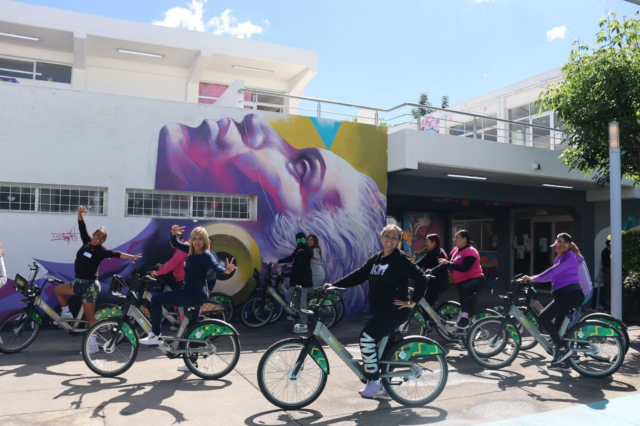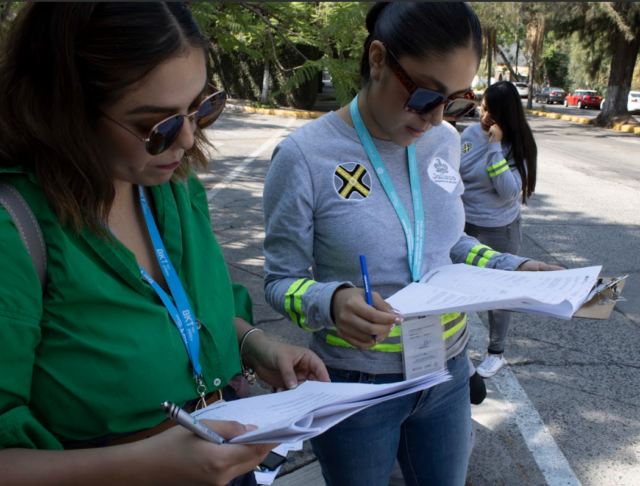In Guadalajara, Women’s Safety Informs Bike Share Expansion
by Odochi Akwani, Writer and Content Manager
May 21, 2025
MiBici, Guadalajara’s bike share system, expanded with eight new stations following their gender-perspective criteria for implementation.

THE PROBLEM
In September 2023, Triana Zepeda was robbed while renting a bike at a MiBici station. Due to street renovations, the station had been relocated. This incident sparked BKT, the company that manages MiBici, to take action. BKT approached Zepeda, an urbanist, activist, and the director of Transeúntas, a collective and activist group in Guadalajara, with a proposal to co-create a guide that the micromobility industry could use when making station placement decisions. BKT wanted to prevent this situation from happening again and knew they needed to consider the security of women and vulnerable groups. AMIM and IMEPLAN, the two government institutions that own and supervise MiBici, gave the project the green light.
THE OPPORTUNITY
According to BKT, their Guide to Gender-Responsive Planning for Public Bike Share (PBS), published in September 2024, is a tool designed to help technical staff in both private and public organizations make better informed decisions about environments and accessibility when planning and placing shared micromobility stations. The guide was inspired by the methodology in Entornos Habitables (Habitable Environments and Citizen Security with a Gender Perspective) from Col·lectiu Punt 6 in Barcelona, which advised MiBici to ensure station placement is in the safest and most habitable spaces in the city.
The first step in creating the guide was collecting feedback from MiBici users.
“The guide was created by taking into consideration the voices of MiBici users. Transeúntas led a walking tour in April [2024] with female MiBici users in areas that had been conflict zones for us, and we wanted to hear their input,” says Gabriela Becerra, community coordinator at MiBici.

A booklet complements the guide, functioning as an assessment tool to apply specific characteristics considered essential to a safe public space or habitable environment. This includes signposting, visibility, vitality, informal surveillance and easy access to help, space planning and maintenance, and community environments.
The 35 questions in the booklet were analyzed during the walking tour by women who use MiBici. Participants used the Perception survey: map of feelings methodology to make note of where they felt safe and unsafe. The questions are broken up into three categories: Infrastructure, Urban Structure, and Technical Feasibility. The women evaluated more than 30 proposed stations, which informed where MiBici installed the final eight stations for their most recent expansion. With this expansion, the MiBici network now boasts nearly 4,000 bicycles and 360 stations.

“I know they’ve been implementing gender perspective [planning] for new stations, and that has definitely been great. One of those stations is near my house, and I can see more lighting around and more life around those stations. That has definitely made me feel safer,” says Grecia Hernández, bike mayor of Guadalajara.
THE BIGGER TRANSPORTATION PICTURE
According to BKT, the need to incorporate gender-responsive planning into MiBici’s expansion was important for their goal of moving toward gender parity in bike share. In 2024, 72.6% of MiBici trips were by men with only 29.82% of trips made by women. In the first half of 2021, however, 56% of trips were made by women, showing that parity is possible
Since women have access to free public transportation in Guadalajara through Yo Jalisco Apoyo al Transporte Público: Mujeres Sostén del Hogar*, which offers them free daily bus, train, or MiBici passes, the hope is that gender-responsive station placement will encourage women to incorporate bike share into their daily routines.
*Yo Jalisco Apoyo al Transporte Público: Mujeres Sostén del Hogar, formerly MiPasaje, is a government mobility support program specifically designed for low-income, female heads of households living in marginalized areas that provides two daily public transportation tickets.
“Most women in the city don’t have a car, so we usually use public transportation,” says Hernández. “The bicycle is such a nice way to connect those commutes. Instead of using two buses, we can take one bus and then use the bike.”
In 2024, 15,000 women participated in Yo Jalisco Apoyo al Transporte Público: Mujeres Sostén del Hogar, and 1,560 of these women were registered for a free MiBici membership. According to Becerra, priority is given to women who live outside of downtown.
“Their movements are completely different from those of other female users; they make broader use of the system,” says Becerra. “This program goes hand in hand with a bike school that operates in low-income areas where the women live, so they can learn and feel safe riding a bike. It’s been really amazing to see different women using the system.”

The eight new stations are spread out across neighborhoods in both Guadalajara and Zapopan, where women in the program tend to live. BKT plans to continue utilizing its gender-responsive planning methodology for future expansions of the MiBici system.
“[Biking] gives you freedom, and it empowers you to use your city and your streets,” says Hernández. “It’s reclaiming space, and MiBici is such a gentle way to do it because it’s public, it’s for everyone. Connect with other women. Ask them: How are their experiences? And ride together.”
If we want to get more women using shared micromobility, we must reconsider their design. Every person deserves to feel safe when accessing public transportation, and shared micromobility should be designed, placed, and accommodating to all users. BBSP encourages shared micromobility practitioners to familiarize themselves with MiBici’s gender-responsive guide and booklet. You can download the Implementation Guide and Evaluation Booklet here.
___________________________________________________________________________________________
The Better Bike Share Partnership is funded by The JPB Foundation as a collaboration between the City of Philadelphia, the National Association of City Transportation Officials (NACTO), and the PeopleForBikes Foundation to build equitable and replicable bike share systems. Follow us on LinkedIn, Facebook, Twitter, and Instagram, or sign up for our weekly newsletter.
Have a question or a story idea? Email odochi@peopleforbikes.org.
